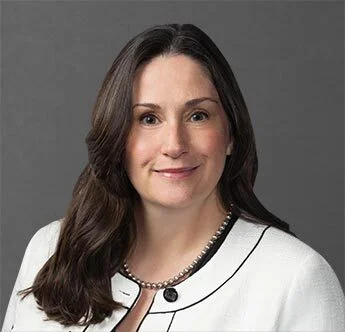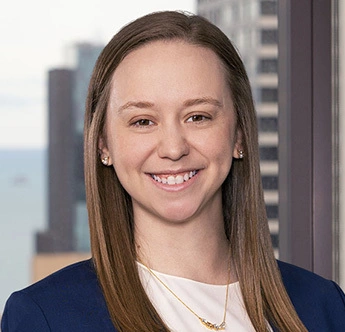Overview
Chapman and Cutler's banking and financial services practice groups represent a wide variety of lending institutions. Our clients include several of the world's largest banks, numerous medium-sized banks, small community banks, finance and mortgage companies, retailers, limited purpose banks, credit unions, and thrift institutions.
Our practice groups fall into five distinct, but complementary, categories:
- Commercial Lending and Real Estate
- Public and Institutional Banking & Finance
- Bank Regulatory Matters
- Consumer Financial Services
- Payment Products and Systems
Chapman lawyers from all of our banking and financial services practice groups work together to meet our clients' legal needs. Representative of the types of commercial credit transactions we regularly handle are syndicated bank credits, asset-based lending transactions, real estate lending and REITs, agribusiness lending, debtor-in-possession financing, asset securitizations, and letters of credit and other credit enhancement transactions.
We also represent banks and other financial services entities with respect to a broad spectrum of consumer-related financial products and services, cash management, payment systems and technology, bank mergers and acquisitions, and all types of bank regulatory and compliance activities.
Concentrations
People
Attorneys
- Associate
- Partner
- Partner
- Partner
- Partner
- Partner
- Associate
- Partner
- Partner
- Associate
- Associate
- Senior Counsel
- Partner
- Partner
- Partner
- Senior Counsel
- Associate
- Partner
- Counsel
- Partner
- Partner
- Partner
- Partner
- Senior Counsel
- Partner
- Partner
- Partner
- Senior Counsel
- Partner
- Partner
- Associate
- Senior Counsel
- Senior Counsel
- Partner
- Associate
- Associate
- Senior Counsel
- Partner
- Partner
- Partner
- Partner
- Partner
- Partner
- Partner
- Associate
- Senior Counsel
- Associate
- Partner
- Associate
- Associate
- Chief Executive Partner
- Associate
- Partner
- Partner
- Partner
- Associate
- Partner
- Associate
- Of Counsel
- Partner
- Senior Counsel
- Partner
- Partner
- Associate
- Associate
- Associate
- Partner
- Partner
- Partner
- Partner
- Associate
- Associate
- Associate
- Partner
- Partner
- Partner
- Partner
- Partner
- Senior Counsel
- Associate
- Partner
- Partner
- Partner
- Senior Counsel
- Partner
- Partner
- Partner
- Associate
- Partner
- Senior Counsel
- Associate
- Partner
- Partner
- Partner
- Partner
- Partner
- Partner
- Practice Innovations and Technology Partner
- Associate
- Senior Counsel
- Associate
- Senior Counsel
Professional Staff
- Paralegal
- Paralegal
- Paralegal
- Senior Paralegal
- Paralegal
Insights
Banking and Financial Services Updates
- VideoAmid growing regulatory activity and accelerating industry adoption, Chapman hosted a cross‑industry panel exploring the growing role of tokenization in financial markets, examining how the technology is advancing, what risks and opportunities it presents, and what market participants should be preparing for next.
- Book
Chapman wrote the book on the marketplace lending regulatory landscape that the entire industry has come to rely upon. First published in 2013, the 2025 update covers a vast array of topics including recent federal, state, and litigation developments and a new section on digital assets, highlighting blockchain, stablecoin legislation, and potential impacts on the marketplace lending industry. This edition reflects post-election regulatory shifts, ongoing true lender litigation, and new challenges for products such as Buy Now Pay Later and Earned Wage Access.
- News
Chapman welcomes partner Rick Antonoff to our Asset Securitization Department and Special Situations and Restructuring Group. Rick has extensive experience representing banks, direct lenders, alternative investment funds, private equity firms, asset managers, and other parties in bankruptcy proceedings and out-of-court workouts across diverse asset classes and industries.
- News
Chapman welcomes Liz Boison to our Compliance, Regulatory and Payments Group. A former federal prosecutor and bank regulatory enforcement attorney, Liz leverages her financial regulatory counseling and litigation experience to help clients prevent and resolve criminal and civil anti-money laundering (AML), sanctions, and consumer protection matters.
- News
- News
Chapman welcomes Curtis Doty to our Corporate and Securities and Banking and Financial Services Departments. A recognized authority in the commercial law, regulatory, and insolvency aspects of derivatives, Curtis Doty further expands the firm's capacity to advise on complex derivatives issues and transactions across multiple sectors of finance.
- ConferenceFebruary 26-29, 2024
Chapman is a proud sponsor of the Fund Finance Association (FFA) 13th Annual Global Fund Finance Symposium
- ConferenceFebruary 6-9, 2024
Chapman is a proud sponsor of the 2024 Turnaround Management Association (TMA) Distressed Investing Conference.
- Client Alert
On November 27, 2023, the US Securities Exchange Commission (“SEC”) adopted final Securities Act Rule 192 (“Final Rule 192”) prohibiting certain conflicts of interest in securitization transactions. In general, Final Rule 192 prohibits a “securitization participant” with respect to an “asset-backed security” (“ABS”) from directly or indirectly engaging in any “conflicted transaction” during the applicable prohibition period.
- Client Alert
The Second Circuit Court of Appeals recently issued an eagerly awaited decision in Kirschner v. JP Morgan Chase Bank, N.A., which reconfirmed the widely accepted view that loans are not securities under federal or state securities laws.
- ConferenceFebruary 8-10, 2023
Chapman is a proud sponsor of the Fund Finance Association (FFA) 12th Annual Global Fund Finance Symposium.
- Client Alert
The much anticipated updated regulations for disclosure requirements for commercial financing in New York have been adopted by the New York Department of Financial Services ("NYDFS").
- ConferenceJanuary 31 - February 3, 2023
Chapman is a proud sponsor of the 2023 Turnaround Management Association (TMA) Distressed Investing Conference.
- Client AlertApril 7, 2020 (Updated June 28, 2022)
On February 19, 2020, the Small Business Reorganization Act came into effect and Debtors with aggregate liabilities that do not exceed $2,566,050 were provided an opportunity to resolve their outstanding liabilities. But even before the SBRA could see its first successes (or failures), the Coronavirus Aid, Relieve and Economic Security Act of 2020 increased a small business’s debt threshold to $7.5 million.
- Client Alert
As interested parties look for more direction on Environmental, Social and Governance (“ESG”) matters, the Loan Syndication and Trading Association (“LSTA”) recently issued new Guidance for Green, Social, and Sustainability-Linked Loans External Reviews (“External Review Guidance”) and Guidance on Social Loan Principles (“Social Loan Principle Guidance”). A summary of this guidance is below.
- Chapman Insights
Lenders and investors are taking different approaches to building ESG portfolios based on the entity’s own preferences and values. However, one widely used tool involves screening of select assets or transactions that align with those values.
- Client Alert
A recent federal district court decision out of Massachusetts found that a bank was the true lender on a loan subsequently transferred to a trust consisting of student loans. Robinson and Spears v. Nat’l. Collegiate Student Loan Trust 2006-2, 2021 WL 1293707, Case No. 20-cv-10203 ADB (D. Mass. April 7, 2021).
- Chapman Insights
At today’s Earth Day Climate Summit, President Joe Biden announced to world leaders that the United States is committed to cutting its greenhouse gas emissions by 50% to 52% from 2005 levels by 2030.
- Chapman Insights
Last week the Loan Syndications and Trading Association, the Loan Market Association, and the Asia Pacific Loan Market Association jointly published their first ever Social Loan Principles.
- Client Alert
In the past few days, two courts have actions that are of significance to marketplace lenders and their funding sources.
- Chapman Insights
The Securities and Exchange Commission this month announced that the Divisions of Corporation Finance, Examinations, and Enforcement are all undertaking climate or ESG-related initiatives.
- Chapman Insights
Environmental, Social and Governance investing in the United States has reportedly reached an estimated $250 billion in assets under management and is expected to see continued growth in 2021 and beyond.
- Client Alert
On December 27, the Consolidated Appropriations Act, 2021 was signed into law, which, among other things, contains an important amendment to Section 547 of the United States Bankruptcy Code.
- Client Alert
Under the expanded Medicare Accelerated and Advance Payments Program, more than 22,000 Medicare Part A providers and 28,000 Medicare Part B suppliers requested and received accelerated or advance payments from the Centers for Medicare & Medicaid Services to help ease financial strain and uncertainty caused by the COVID-19 pandemic.
- Client Alert
In 2015, the Second Circuit Court of Appeals issued an opinion finding that, under the doctrine of federal preemption, a non-bank assignee of a bank loan could not charge and collect the rates and fees that the bank could charge and was therefore subject to state law usury limits.
- White Paper
As companies default under their credit agreements, lenders have to decide what course of action is appropriate to effectuate their goals. Should the lender give the borrower breathing room by entering into a forbearance agreement in exchange for certain milestones, or is more aggressive enforcement action required?
- ArticleThe Banking Law Journal
The Office of the Comptroller of the Currency recently issued its final rule codifying as a regulation that the interest charged on loans that is permissible before the loan is transferred remains in effect after the loan is transferred.
- Client Alert
The parties to the closely watched litigation by the Attorney General of Colorado as Administrator of the Colorado Uniform Consumer Credit Code against two marketplace lending platforms have agreed to settle the litigation.
- Client Alert
This is the third and final Client Alert of a three-part series relating to executing a Strict Foreclosure. As discussed in our previous Client Alerts, it is imperative to focus on who is going to run the business after consummating the Strict Foreclosure.
- News
On July 22, Online Lending Policy Institute hosted a conversation covering the new FDIC rule issued on June 25 which adopts the common law doctrine of “valid when made” as well as other topics related to fintech.
- ArticleJournal of Taxation of Financial Products
The CARES Act, which was designed to support individuals and businesses affected by the COVID-19 pandemic, was signed into law on March 27. This article summarizes various tax provisions in the CARES Act.
- Client Alert
The Office of the Comptroller of the Currency and the Federal Deposit Insurance Corporation have been quite active in issuing or proposing new regulations and initiatives focused on financial technology and innovation in financial services.
- Client Alert
This is the second Client Alert of a three-part series relating to executing a Strict Foreclosure.
- Client Alert
This Client Alert is part of a three Alert series. This Alert focuses on when Strict Foreclosure can be a lender’s best option and the potential path to execute a Strict Foreclosure.
- Client Alert
The Federal Reserve has established the Main Street Loan Program to provide support to small and medium-sized businesses that were in sound financial condition before the onset of the COVID-19 pandemic.
- Interview
On June 11, the Online Lending Policy Institute hosted a conversation covering the expansive advance notice of proposed rulemaking in the fintech space.
- Client Alert
On June 11, the Federal Reserve Bank of New York issued an updated Notice of Interest for the Municipal Liquidity Facility to reflect the expansion of eligibility for the facility.
- Client Alert
On June 5, the Paycheck Protection Program Flexibility Act of 2020 was signed into law and made key changes to the Paycheck Protection Program just a few weeks before the program’s official termination on June 30.
- Client Alert
On June 3, the Federal Reserve announced expanded eligibility for its Municipal Liquidity Facility. Under the new terms, a State that does not have at least two total counties or cities that meet the minimum population requirements will be able to identify a city or county to be an Eligible Issuer.
- Client Alert
On May 29, the Office of the Comptroller of the Currency issued its final rule codifying as a regulation that the interest charged on loans that is permissible before the loan is transferred remains in effect after the loan is transferred.
- Client Alert
This client alert will address questions about loan forgiveness under the Paycheck Protection Program for both borrowers and lenders as known at the current time, but we note that legislative efforts currently underway may change the terms of these loan forgiveness provisions.
- Client AlertMay 7, 2020 (Updating an April 14, 2020 Client Alert)
This alert explores the three loan facilities constituting the Main Street Lending Program: the newly announced Main Street Priority Loan Facility, the revised Main Street New Loan Facility, and the revised Main Street Expanded Loan Facility.
- Client Alert
On May 5, federal banking regulators adopted an interim final rule that neutralizes the liquidity coverage ratio impact for banks participating in the Federal Reserve’s Money Market Mutual Fund Liquidity Facility and the Paycheck Protection Program Liquidity Facility.
- Client Alert
On April 27, the Federal Reserve issued a press release announcing changes to the Municipal Lending Facility described in previous client alerts. At the same time, the Federal Reserve Bank of New York, as sole Reserve Bank lender for the facility, issued a FAQs for the facility.
- Client Alert
The Paycheck Protection Program and Health Care Enhancement Act was signed into law today. This alert summarizes key portions of the Act and recently released information from the Department of Health and Human Services explaining its plans to allocate and distribute the Provider Relief Fund money.
- Client AlertApril 22, 2020 (Updating an April 13, 2020 Client Alert)
On April 9, the Federal Reserve issued term sheets for six “new” funding facilities under the CARES Act. This client alert describes in detail the Municipal Liquidity Facility.
- White Paper
Chapman’s "Bankruptcy and Aircraft Finance" handbook details certain special rights afforded aircraft creditors and some of the strategies employed. With the airline industry suffering devastating losses as a result of the COVID-19 pandemic, we hope this will be a useful resource for creditors.
- Client Alert
On April 9 the Federal Reserve issued term sheets for six “new” funding facilities under the CARES Act. Three of those facilities provide for direct loans to companies.
- Client Alert
The Coronavirus Aid, Relief, and Economic Security Act to support individuals and businesses affected by COVID-19 pandemic was signed into law on March 27. This client alert summarizes the various tax provisions in the CARES Act.
- Client Alert
Earlier today the Federal Reserve announced it would establish six new funding facilities supported by Treasury funding authorized by Section 4003(b)(4) of the CARES Act.
- Client Alert
- Client Alert
The Federal Reserve has established a webpage that provides links to a FAQ and other documents for the Money Market Fund Liquidity Facility described in earlier Chapman client alerts.
- Client Alert
Yesterday the Federal Reserve announced it was temporarily removing Treasury securities and deposits at Federal Reserve Banks from the supplementary leverage ratio applicable to Category I-III bank holding companies or US intermediate holding companies of foreign banks.
- Client Alert
In response to the COVID-19 pandemic, federal and state courts throughout the country are issuing general orders providing for important changes to procedures for pending and newly scheduled court hearings. This is a summary of such procedural changes for the federal courts located in Chicago and the state courts in Cook and the surrounding collar counties.
- Client AlertApril 1, 2020 (Updating a March 31, 2020 Client Alert)
This client alert has been updated from our March 31, 2020 client alert to reflect guidance from the U.S. Treasury Department and the Small Business Administration.
- Client Alert
The $2 trillion stimulus bill is the largest stimulus bill in U.S. history and Congress’ third major piece of legislation to address the COVID-19 crisis. This client alert summarizes notable CARES Act provisions for Institutions of Higher Education.
- Client Alert
The cornerstone of the CARES Act’s relief package for small businesses is the Paycheck Protection Program, under which the Small Business Administration will guarantee up to $349 billion in small business loans.
- Client Alert
The Coronavirus Aid, Relief, and Economic Security Act, a bill designed to provide financial support and resources to individuals and businesses affected by COVID-19 pandemic, was signed into law on March 27. This client alert summarizes notable CARES Act provisions for health care businesses, including hospitals and physician practices.
- Client Alert
This Client Alert focuses on some major programs established by the Coronavirus Aid, Relief, and Economic Security Act to financially support, through loans or grants, (1) small businesses, (2) larger businesses, and (3) states and municipalities.
- Client Alert
While many questions and uncertainties exist with respect to the impact of COVID-19 on the economy, this is an overview of the prominent issues for lenders to consider regarding existing middle market credit agreements – particularly, as a spike in amendment and waiver activity is expected in coming months.
- Client Alert
H.R. 748 better known as the CARES Act or more informally as the $2 trillion stimulus bill signed by President Trump on March 27, 2020, contains one important provision for all consumer lenders and another two provisions related to federally-backed mortgage loans.
- Client Alert
On March 23, the Federal Reserve issued further amendments to add negotiable certificates of deposit and all short-term municipal securities to the list of eligible collateral.
- Client Alert
On March 23, the Federal Reserve added municipal issuers and amended the pricing for the commercial paper funding facility announced on March 17 and issued other “program terms and conditions” posted on the website of the Federal Reserve Bank of New York.
- Client Alert
This morning, the Board of Governors of the Federal Reserve System announced sweeping actions to help the economy.
- Client Alert
On March 18, the Federal Reserve announced a Money Market Fund Liquidity Facility to make loans to banks and certain affiliates secured by certain assets acquired from “prime” money market funds. Earlier today, the Federal Reserve issued amendments to the program.
- Client Alert
On March 17, the Federal Reserve Board announced the establishment of two emergency funding facilities that closely mirror facilities established in 2008 during the last financial crisis in providing liquidity to both short and long term funding markets.
- ArticleThe Banking Law Journal
On September 17, the SEC announced proposed rules to update the statistical disclosures that bank and savings and loan registrants provide to investors and eliminate disclosures that overlap with other SEC rules, U.S. GAAP or IFRS.
- Client Alert
The California Consumer Privacy Act of 2018 went into effect on January 1, 2020 and imposes extensive disclosure and record-keeping requirements on businesses that handle personal information.
- Client Alert
On November 22, in a fact-specific ruling, the U.S. Court of Appeals for the First Circuit held that two separate, but related Sun Capital Partners Inc. private equity investment funds were not liable for the multiemployer plan withdrawal liability of a bankrupt portfolio company that the two funds co-owned.
- Client Alert
In a case of first impression, the Seventh Circuit recently held that a UCC financing statement that incorporates a description of collateral by reference to an unattached security agreement sufficiently “indicates” the collateral, such that a separate and additional description of the collateral is not required to properly perfect a lender’s security interest.
- ArticleJuly/August 2019The Banking Law Journal
The First Circuit recently found that a UCC filing amendment naming the debtor contained an appropriate name and that, when coupled with a corrected collateral description in the amendment, the bondholders’ lien was perfected and therefore unavoidable under the “strong-arm” provisions of the Bankruptcy Code.
- ArticleJuly/August 2019The Banking Law Journal
The US Court of Appeals for the Ninth Circuit is the latest court in a developing line of case law to find that the doctrine of equitable mootness applies to prevent an aggrieved creditor from unwinding a substantially consummated Chapter 9 municipal bankruptcy plan.
- ArticleSpring 2019Real Estate Finance Journal
Having failed in attempts to accelerate the termination of a CDO, an investor group holding senior notes filed an involuntary petition against an issuer to liquidate the CDO before its stated maturity under the U.S. Bankruptcy Code.
- ArticleThe Banking Law Journal
This article outlines the features of proposals to adjust the applicability of certain capital and liquidity tests and certain enhanced prudential standards for bank holding companies.
- ArticleThe Banking Law Journal
A recent decision of the United States District Court for the District of Delaware has provided further support within the Third Circuit for so-called “gift” plans (i.e., plans in which a secured creditor class “gifts” a portion of its plan distribution to a junior class).
- Client Alert
The state of Colorado initiated two lawsuits against online lending platforms. The suits alleged that the platforms had violated the state’s Uniform Consumer Credit Code by charging interest and some fees in excess of those allowed under Colorado law and that the consumer loan agreements utilized a non-Colorado governing law provision, also in violation of the law.
- Client Alert
New treasury regulations proposed by the Internal Revenue Service on October 31 significantly diminish the sting of Section 956 for many US corporations that own stock in non-US corporations that have investments in US property.
- ArticleNovember/December 2018Pratt's Journal of Bankruptcy Law
In two recent cases, the Court of Appeals for the Seventh Circuit held that the Illinois Department of Revenue could not collect delinquent retail and sales taxes from the proceeds of assets sold pursuant to section 363 of the Bankruptcy Code.
- ArticleNovember/December 2018Pratt's Journal of Bankruptcy Law
The U.S. Court of Appeals for the Fifth Circuit recently affirmed decisions of a Bankruptcy Court and District Court recharacterizing an alleged lease to a disguised financing arrangement. The Court determined that the transaction was “per se” a financing, and therefore did not need to go on to analyze the economic realities of the transaction in detail.
- Client Alert
On September 30, the Governor of California signed into law Senate Bill No. 1235, which amends the California Financing Law (previously known as the Finance Lenders Law) to impose new disclosure requirements on licensed commercial lenders and brokers including for online lending programs doing business in California.
- White PaperOctober 2018
This desk reference is intended to provide an in-depth analysis of the numerous issues affecting an equipment lessor when dealing with a lessee after it has filed for bankruptcy protection.
- Client Alert
On August 22, the three federal banking agencies issued an interim final rule implementing the May 2018 banking law’s requirement that investment grade, liquid and readily marketable municipal obligations be treated as Level 2B “high quality liquid assets” under the liquidity coverage ratio rule.
- Client Alert
The United States Court of Appeals for the Ninth Circuit issued a decision reversing a lower court’s order that designated the vote of a secured bank creditor that had purchased claims from a subset of unsecured creditors for the admitted purpose of blocking confirmation of the debtor’s plan of reorganization.
- Client Alert
In a case of first impression, the Illinois Appellate Court has held that a condominium association does not have to first sue the prior owner of a condominium for unpaid assessments before it can seek unpaid assessments from the new owner that purchased the condominium at a foreclosure sale.
- Client Alert
A recent decision from the U.S. Court of Appeals for the Third Circuit has created a circuit split in how the federal circuit courts have interpreted the statute of limitations as it applies to the Fair Debt Collection Practices Act.
- ArticleLexisNexis Emerging Issues Analysis
This article discuss two recent decisions that have provided some insight into what happens when a debtor files a Chapter 13 bankruptcy petition as a means of redeeming sold real estate taxes.
- Client Alert
Recently in Hackler v. Arianna Holding Co., the U.S. District Court for the District of New Jersey held that a real estate tax foreclosure sale can be set aside as a preferential transfer under Section 547 of the Bankruptcy Code.
- White PaperMarch 2018
Chapman’s "Defaulted Securities: The Guide for Trustees and Bondholders" advances understanding and consideration of issues related to trustees and bondholders in both corporate and municipal financings.
- ArticleApril/May 2018Pratt's Journal of Bankruptcy Law
The question of what happens when a debtor files a Chapter 13 bankruptcy petition as a means of redeeming sold real estate taxes is being addressed throughout the country with more regularity. Recently, bankruptcy courts in Illinois and Georgia have provided some insight into how this question should be answered.
- Client Alert
Although recent legislation commonly referred to as the Tax Cuts and Jobs Act retained Section 956 of the Internal Revenue Code (and its notorious deemed dividend issue), the enactment of other changes may reduce the impact of Section 956 on taxpayers.
- ArticleThe Banking Law Journal
In July, Andrew Bailey, the CEO of the United Kingdom’s Financial Conduct Authority, announced that the FCA and the panel banks whose submissions are used to determine the London Interbank Offered Rate will only sustain LIBOR until the end of 2021.
- ArticleThe Banking Law Journal
This article addresses the benefits to a senior secured lender of Representations and Warranties Insurance, and certain considerations financial institutions should make in documenting a middle market loan transaction when an acquisition financing utilizes RWI.
- Client Alert
A debtor-in-possession is entitled to use cash collateral over the objections of PACA claimants so long as the debtor demonstrates that the interests of the PACA claimants are adequately protected, according to a recent ruling by Judge Dales of the United States Bankruptcy Court for the Western District of Michigan.
- Client Alert
On November 2, Representative Brady released the “Tax Cuts and Jobs Act.” On November 9, the Senate Finance Committee released a “Description of the Chairman’s Mark of the ‘Tax Cuts and Jobs Act.’” This summary highlights four provisions in the proposed legislation that will be of particular interest to financial institutions.
- Client Alert
Federal Rule of Appellate Procedure 4(a)(5) incorporates 28 U.S.C. § 2107(c), which provides for extensions of the notice of appeal deadline. However, Rule 4(a)(5)(C) limits the length of such extensions. The question then is if an appellant files a notice of appeal beyond the 30-day period set forth in Rule 4(a)(5)(C), does a circuit court lack jurisdiction to hear the appeal?
- Client Alert
The U.S. Court of Appeals for the Second Circuit reversed both the district court and the bankruptcy court’s decisions in MPM Silicones, LLC, which had held that the “prime plus” formula was the appropriate method for determining the interest rate required in connection with new notes issued to secured creditors under a Chapter 11 cramdown plan of reorganization.
- ArticleOctober 19, 2017 (Originally Published October 4, 2017)
On September 21, a Bankruptcy Court ruled that holders of notes issued pursuant to a Note Purchase Agreement entered into by a debtor’s operating subsidiary were entitled to what the court termed an ‘enormous’ make-whole payment, post-petition interest, and recovery of related fees and expenses.
- Client Alert
On October 3, the U.S. Bankruptcy Court for the District of Delaware granted a motion to reconsider a decision it made over a year ago in the bankruptcy of Energy Future Holdings Corp. and its co-debtors and in doing so disallowed a $275 million breakup fee to a prospective asset purchaser that it had previously approved.
- Client Alert
The recently released “Unified Framework for Fixing Our Broken Tax Code” includes a proposed limitation on the deductibility of interest expense by corporations. Although this framework does not provide details as to the nature or scope of the proposed limitations, any such limitations will potentially affect the balance in preferences between debt and equity funding.
- ArticleOctober 2017 (Originally Published July 25, 2017)Pratt's Journal of Bankruptcy Law
While many of lender's rights are self-explanatory, a question has arisen as to what it means to amend “pro rata” sharing requirements. Recently, an amendment to NYDJ Apparel, LLC’s credit agreement highlighted what a loan investor needs to look out for when reviewing protections related to pro rata sharing.
- ArticleSeptember 2017 (Originally Published May 10, 2017)Pratt's Journal of Bankruptcy Law
Intercreditor agreements are commonly used to define the relative rights of senior and junior lenders, especially should the borrower become distressed or file bankruptcy. Properly defining priorities between lenders is particularly important when both parties possess security interests in the same collateral.
- ArticleLaw360
On August 3, 2017, the Delaware district court upheld the Delaware bankruptcy court’s confirmation of a so-called “gift” plan (i.e., a plan in which a secured creditor class “gifts” a portion of its plan distribution to a junior class).
- Client Alert
On August 3, the Delaware district court in In re Nuverra Environmental Solutions, Inc. upheld the Delaware bankruptcy court’s confirmation of a so-called “gift” plan, notwithstanding the recent Supreme Court decision in Czyzewski v. Jevic Holding Corp. that had cast doubt on the viability of such plans.
- Client Alert
Compliance with the Telephone Consumer Protection Act has never been simple, and a number of conflicting and confusing rulings over the last several years have made it that much more difficult. The TCPA contains a confusing array of regulations depending on what kind of phone is being called, who is calling and what purpose the call serves, and whether the person being called has given permission.
- White PaperJuly 2017National Association of Bond Lawyers
This paper, published by the National Association of Bond Lawyers, identifies various issues that arise in connection with the structuring and negotiation of direct purchase transactions, and explores some of the more commonly encountered provisions present in direct purchase documents.
- Client Alert
More than a year after the Consumer Finance Protection Bureau submitted a proposed rule to limit consumer financial services contract arbitration clauses, the CFPB sounded the death knell on July 10, 2017, when it released its long-awaited final rule.
- InterviewJuly 2017
Chapman Partner Nick Whitney joined Xtract Research’s senior covenant analyst Vince Pisano for the inaugural recording of the new Xtract Research podcast series.
- Client Alert
On June 12, the Department of Treasury issued the first report in a series regarding regulation of the financial system. The report recommends that high-grade municipal bonds be categorized as Level 2B liquid assets instead of generally being excluded as HQLA currently.
- Client Alert
On June 12, the Department of Treasury issued the first report in a series regarding regulation of the financial system in a manner consistent with Core Principles set forth in Executive Order 13772 signed by President Trump on February 3, 2017.
- Client Alert
In a unanimous decision on June 12, the United States Supreme Court held that a purchaser of defaulted debt who pursues repayment is not a “debt collector” under the Fair Debt Collection Practices Act.
- Client Alert
In a recent case, the Sixth Circuit held that under Michigan law a properly perfected assignment of rents bars a debtor from using the rents to fund its operations in a Chapter 11 reorganization.
- Client Alert
The Supreme Court continues to redefine the scope of the Fair Debt Collection Practices Act, with one highly anticipated ruling issued this week and another expected before the Court adjourns for the summer in late June.
- ArticleMay 2017The Banking Law Journal
The May 2015 decision of the U.S. Court of Appeals for the Second Circuit in Madden v. Midland Funding, LLC sent shockwaves through the marketplace lending industry, and nearly two years later the questions generated by this case remain largely unanswered. These questions have been further complicated by the long-awaited remand decision from the U.S. District Court for the Southern District of New York.
- ArticleMay 2017 (Originally Published March 8, 2017)The Banking Law Journal
This article discusses a financial institution’s obligation to manage risks of its HELOC Home Equity Line of Credit portfolio, focusing on the applicable regulatory requirements and restrictions on the ability to freeze or reduce HELOCs during the draw period.
- Client Alert
11 U.S.C. § 1111(b)(1)(A) provides that a creditor holding a non-recourse lien on real property possesses a claim against a debtor’s bankruptcy estate upon the filing of the bankruptcy petition. But what happens to the secured creditor’s non-recourse claim when the property securing the loan has been sold via foreclosure?
- Client Alert
The Uniform Commercial Code affects financial institutions in countless ways. From duties of care for customers to the banks’ inspection of checks, familiarity with the UCC is critical when examining legal disputes. This alert discusses recent developments in UCC law that provide insight into how courts examine these rules and financial institutions’ responsibilities under the UCC.
- Client Alert
On April 19, the House Financial Services Committee posted a “discussion draft” of a revised version of the CHOICE Act. The discussion draft contains most of the provisions in last year’s bill with a number of important changes.
- Client Alert
2016 was a record year for filings under the Telephone Consumer Protection Act of 1991. In 2016, litigants filed 4,860 TCPA lawsuits, an increase of nearly 32% from 2015. But what does 2017 hold? What can companies who call customers to service or collect debts expect?
- ArticleLaw360
On March 27, the U.S. Supreme Court granted certiorari in the case of In re the Village at Lakeridge LLC, under which an appeals court held that a claim of an “insider,” which is not counted for the purpose of creating an accepting impaired class for the purpose of “cramming down” a plan of reorganization over the opposition of a rejecting class, does not retain its status as a claim of an insider for that purpose once transferred to a noninsider third party.
- Client Alert
On March 1, the Securities and Exchange Commission issued a release seeking comments on proposed amendments to Rule 15c2-12 under the Securities Exchange Act of 1934, as amended.
- ArticleMarch 2017ACIC Private Notes / Harvard Law School Bankruptcy Roundtable
Before purchasing any debt, distressed investors need to be mindful of what unrestricted subsidiaries are and how they may impact the overall credit of a company or debt recoveries.
- NewsMarch 2017
Chapman Partner Marc Franson participated in a panel discussion, entitled "True Lender and Madden Case: Impact on the Industry Two Years In," at the 2017 LendIt USA Conference.
- Client Alert
In a stark reminder to the bankruptcy community of the old adage that “you can run but you can’t hide,” the U.S. Bankruptcy Court for the Southern District of New York recently denied an Austrian bank’s motion to dismiss for lack of personal jurisdiction.
- Client Alert
On February 27, the U.S. District Court for the Southern District of New York issued its long-awaited remand decision in Madden v. Midland Funding, LLC.
- Client Alert
The U.S. Court of Appeals for the D.C. Circuit made headlines following its decision in the PHH Corporation et al. v. Consumer Financial Protection Bureau case. The Court found that the CFPB’s single-director, removable-only-for-cause structure was unconstitutional. However, the Court has now vacated that order in its entirety and set the case to be heard again en banc.
- ArticleLaw360
Investments in “unrestricted subsidiaries” are an exception to investment covenants, which have been used in an attempt to provide flexibility in restructuring a company’s capital structure.
- Client Alert
The Supplemental Examination Procedures for Risk Management of Third-Party Relationships issued by the Office of the Comptroller of the Currency on January 24 establish detailed compliance obligations for relationships with third-party service providers.
- ArticleLaw360
Lenders and investors in companies often have assumed that claims related to the purchase and sale of securities are subordinated to the level of the underlying security in question. However, a recent decision has raised a serious question as to when claims for damages should be deemed “arising from” the purchase or sale of a security.
- Compliance, Regulatory and Payments Client AlertsLegal, Operations, and Strategy Briefs for Financial Institutions
In this edition:
- Mortgage Servicing Foreclosure Practices
- OCC Semiannual Risk Perspective
- ArticleFebruary/March 2017Pratt's Journal of Bankruptcy Law
With Republicans retaining control of both chambers of Congress and Donald Trump elected President, the prospects for financial regulatory reform have changed. Many observers point to the Financial CHOICE Act as the best indication of Republican Congressional aspirations for such reform.
- Client Alert
Lenders and investors in companies often have assumed that claims related to the purchase and sale of securities are subordinated to the level of the underlying security in question. However, a recent decision has raised a serious question as to when claims for damages should be deemed “arising from” the purchase or sale of a security.
- Client Alert
In a decision that deals a potential blow to holdout noteholders in out-of-court restructurings, the United States Court of Appeals for the Second Circuit adopted a narrow interpretation of Section 316(b) of the Trust Indenture Act.
- Client Alert
In one of his first Presidential acts, President Trump has named Commissioner Ajit Pai as Chairman of the Federal Communications Commission. Chairman Pai has become well-known for his dissenting opinions during his time with the FCC, including his dissent to the most recent Telephone Consumer Protection Act Omnibus Ruling and Order issued in July 2015.
- ArticleNovember/December 2016Illinois Banker
Considering the flurry of activity in the fintech arena, is there a place for banks and, if so, what role can banks play? Given that marketplace lending is the most developed form of fintech today, it can be analyzed to see how banks do play important roles and employ different strategies dealing with this emerging market segment.
- Client Alert
The New York Court of Appeals issued a decision holding that when two parties agree to the material terms of a sale, the parties have entered into a binding agreement, even though the sale remains subject to the execution of a written sales agreement.
- Compliance, Regulatory and Payments Client AlertsLegal, Operations, and Strategy Briefs for Financial Institutions
On Friday, Comptroller of the Currency Thomas Curry announced that the Office of the Comptroller of the Currency will issue limited-purpose bank charters to qualified fintech companies.
- Compliance, Regulatory and Payments Client AlertsLegal, Operations, and Strategy Briefs for Financial Institutions
In this edition:
- Deposit Insurance Determination Rule
- FFIEC Revises Its Consumer Compliance Rating System
- Servicemembers
- ArticleLaw360
In a break from recent decisions, on November 17, the Third Circuit Court of Appeals reversed the District Court’s decision in the Energy Future case, finding that make-whole premiums were in fact payable upon a “redemption” even if such redemption occurred after a bankruptcy filing and the automatic acceleration of the underlying debt where the applicable indentures did not otherwise provide.
- ArticleNovember/December 2016 (Originally Published August 31, 2016)Pratt's Journal of Bankruptcy Law
A recent bankruptcy court decision in the Aéropostale bankruptcy case pending in the bankruptcy court for the Southern District of New York may provide some comfort to secured creditors seeking to credit bid in a sale process commenced by a debtor pursuant to Section 363 of the U.S. Bankruptcy Code.
- Chapman Insights
The second edition of Chapman's book is a valuable resource for municipal debt marketplace participants, including state and local government officials, municipal credit analysts, credit enhancers, investors, legislators, and administrators.
- ArticleLaw360
Earlier this month, the Sixth Circuit provided to creditors of municipalities emerging from bankruptcy proceedings additional assurance that they can rely on the bankruptcy plan approved by a court.
- Client Alert
The U.S. Court of Appeals for the D.C. Circuit heard oral argument yesterday in a consolidated case arguing that the Federal Communication Commission has overstepped its bounds in its most recent interpretation of the Telephone Consumer Protection Act.
- Client Alert
On October 11, the U.S. Court of Appeals for the D.C. Circuit issued an important decision involving the Consumer Financial Protection Bureau. Not only did the Court find that the agency’s structure was unconstitutional, it also ruled that the CFPB violated due process, and is subject to the statutes of limitations embodied in the laws it seeks to enforce.
- Client Alert
Last week, the U.S. Sixth Circuit Court of Appeals provided to creditors of municipalities emerging from bankruptcy proceedings additional assurance that they can rely on the bankruptcy plan approved by the court.
- ArticleLaw360
Despite the Supreme Court cautioning that the “reasonably equivalent value” principle would in most cases remain similar to a market-value definition, and refusing to force its holding on other forced-sale proceedings, on Sept. 8, 2016, the Ninth Circuit became the third federal appeals court to extend BFP’s holding to real estate tax sales.
- ArticleSeptember 2016ACIC Private Notes
The services agreements under which midstream oil and gas companies operate are routinely structured as long-term contracts requiring a large initial expenditure. In these cases, the midstream service providers’ investment is only recouped over the life of the agreement, and early termination or rejection of such agreements can be devastating.
- Client Alert
On September 8, 2016, the Ninth Circuit held in In re Tracht Gut, LLC v. L.A. Cnty. Treasurer & Tax Collector that California real estate tax sales are for reasonably equivalent value and cannot be set aside as fraudulent transfers.
- Chapman Insights
Federal law creates an exemption from environmental liability for lenders under the federal Comprehensive Environmental Response, Compensation, and Liability Act, which provides that a party who owns or operates a facility can be held responsible for cleaning up hazardous waste at or from the facility regardless of whether that party caused or contributed to the contamination.
- Client Alert
On August 1, the Municipal Securities Rulemaking Board released details from its most recent quarterly meeting. Among other things, the press release from the meeting stated that the MSRB will not pursue rulemaking with regard to its concept proposal to require municipal advisors to disclose information about bank loans entered into by their municipal issuer clients.
- ArticleSpring/Summer 2016 (Originally Published April 7, 2016)Real Estate Finance Journal
The Board of Governors of the Federal Reserve adopted a final rule to include certain U.S. municipal securities as high-quality liquid assets for purposes of the liquidity coverage ratio rule to which large banks are subject.
- ArticleJuly 25, 2016 (Originally Published July 22, 2016)Lending Times
A recent decision of the Maryland Court of Appeals could require marketplace lenders and others who arrange for federal or state banks to fund consumer loans to consumers residing in Maryland to obtain licenses as “credit services businesses” and could prohibit them from arranging those loans at interest rates exceeding the applicable Maryland usury caps.
- Client Alert
Congress has approved the Puerto Rico Oversight, Management, and Economic Stability Act, and President Obama is expected to sign the measure into law by July 1, 2016. Puerto Rico owes its bondholders a $1.9 billion debt payment on July 1 that by all accounts it cannot make.
- ArticleJune 2016AIRA Journal
This article discussed leveraged lending guidelines, unitranche facilities and the risks associated with unitranche facilities, including with respect to “agreements among lenders” as illustrated by the recent case of In re Radio Shack Corporation.
- Client Alert
On June 3, 2016, the United States Bankruptcy Court for the District of Delaware ruled that the intercreditor agreement between first lien noteholders and junior noteholders in In re Energy Future Holdings Corp. did not require the junior noteholders to bear the cost of a previously disallowed make-whole payment to the first lien noteholders.
- ArticleJune 23, 2016 (Originally Published May 31, 2016)Law360
On May 27, 2016, New Jersey Gov. Chris Christie signed into law the Casino Tax Property Stabilization Act in an effort to help Atlantic City get back on the path to fiscal stability.
- Client Alert
The U.S. Supreme Court placed the final nail in the coffin of the Puerto Rico Public Corporation Debt Enforcement and Recovery Act. The Court found that Puerto Rico was not entitled to create its own restructuring process because such a process is prohibited by the Bankruptcy Code.
- ArticleMay 2016ACIC Private Notes
Over the past several years, a number of public-private partnership transactions have been financed in the domestic and cross-border U.S. private placement market. Given the need for new infrastructure both domestically and abroad, we anticipate that the number of P3 transactions entering the U.S. private placement market will continue to rise over the coming years.
- Client Alert
New Jersey has taken steps to aid troubled Atlantic City in an apparent attempt to avoid a bankruptcy filing that may not only impact the distressed city but also other cities and towns in the State.
- Client Alert
It is a basic principle in bankruptcy that a secured lender is entitled to receive interest and other charges arising post-petition to the extent the lender is over-secured. A recent decision challenges this principle in cases where the value of a lender’s collateral diminishes during the course of the bankruptcy case.
- Compliance, Regulatory and Payments Client AlertsLegal, Operations, and Strategy Briefs for Financial Institutions
In this edition:
- NACHA Operating Rules — New Unauthorized Entry Fee
- Customer Due Diligence — Beneficial Ownership Rule
- Limited English Language Proficiency Customers
- ArticleLaw360
A recent decision issued by a federal district court in North Carolina challenges the familiar principle that in a borrower’s bankruptcy, the lender, if it is oversecured as of the bankruptcy filing date, is entitled to receive post-petition interest, attorneys’ fees and other charges arising post-petition to the extent of the value of its collateral.
- ArticleThe Wall Street Journal
Atlantic City is in the midst of a financial crisis that has been in the making for years. Increased competition and a host of unfortunate spending and hiring decisions have led to a state of affairs that currently features the nation’s highest home foreclosure rate, junk bond credit status and an alarmingly large budget deficit.
- Client Alert
On April 4, the U.S. Treasury Secretary announced that the government would release regulations to curb inversions and reduce the ability of companies to avoid taxes through “earnings stripping;” those regulations were published in the Federal Register on April 8th.
- Client Alert
On May 10, 2016 the U.S. Department of the Treasury published a white paper entitled “Opportunities and Challenges in Online Marketplace Lending.” The White Paper follows the “Request for Information” which the Department published in July 2015 to solicit public input on various topics concerning marketplace lending.
- Client Alert
The Board of Governors of the Federal Reserve System issued a Notice of Proposed Rulemaking re-proposing a rule that would establish credit limits for single counterparties ofU.S. bank holding companies, foreign banking organizations, and U.S. intermediate holding companies of an FBO.
- ArticleMay 2016 (Originally Published February 3, 2016)Pratt's Privacy & Cybersecurity Law Report
Pratt's Privacy & Cybersecurity Law Report republished a special edition of Chapman's To the Point! newsletter.
- Compliance, Regulatory and Payments Client AlertsLegal, Operations, and Strategy Briefs for Financial Institutions
In this edition:
- Recent Action by the OCC of Special Concern for Directors, Senior Managers, and Compliance Officers
- FDIC Provides Additional Guidance on Corporate Governance
- Client Alert
In a widely expected ruling, the Illinois Supreme Court has upheld a Cook County state court ruling holding that a state law, Public Act 98-641, reducing annuity benefits for employees and retirees of the City of Chicago, in exchange for increased contributions to certain pension funds, was unconstitutional.
- Client Alert
Retail bondholders recently filed two class action suits in the United States District Court for the Southern District of New York challenging exchange offers under the Trust Indenture Act.
- Compliance, Regulatory and Payments Client AlertsLegal, Operations, and Strategy Briefs for Financial Institutions
In this edition:
- Use of Property Evaluations
- A Bank Customer’s Guide to Cybersecurity
- Certain Prepaid Cardholders Treated as Customers for CIP Requirements
- Client Alert
On Friday, March 18, 2016, the United States Supreme Court issued a call for the views of the Solicitor General of the United States before it decides whether to hear an appeal from a Second Circuit Court of Appeals decision rendered last May in the case of Madden v. Midland Funding, LLC.
- Compliance, Regulatory and Payments Client AlertsLegal, Operations, and Strategy Briefs for Financial Institutions
On March 7, the CFPB announced that it is accepting consumer complaints about online marketplace lenders, giving consumers “a greater voice in these markets and a place to turn to when they encounter problems.” The CFPB also issued a bulletin to provide consumers with information on marketplace lending.
- Client Alert
On February 16, 2016, the District Court for the District of Delaware affirmed the decision of the Delaware bankruptcy court in In re Energy Future Holdings Corp., that noteholders’ claims for make-whole premiums may be blocked by the automatic stay of the U.S. Bankruptcy Code.
- Compliance, Regulatory and Payments Client AlertsLegal, Operations, and Strategy Briefs for Financial Institutions
In this edition:
- Standards for Safeguarding Customer Financial Information
- HIPAA Data Breach Notification Deadline — February 29, 2016
- CFPB Issues Additional Guidance on Furnisher Obligations under Regulation V
- Court Denies Motion to Dismiss Complaint Against Compliance Officer for Bank Secrecy Act Violations
- ArticleLaw360
On Feb. 8, 2016, the United States Court of Appeals for the Ninth Circuit held that a claim of an “insider,” which is not counted for the purposes of creating an accepting impaired class for confirmation of a contested plan of reorganization, does not retain insider status once transferred to a third party that is not an insider.
- ArticleFebruary 8, 2016 (Originally Published February 1, 2016)Law360
Law360 republished a Chapman Client Alert.
- Client AlertFebruary/March 2016 (Originally Published October 15, 2016)Pratt's Journal of Bankruptcy Law
Pratt's Journal of Bankruptcy Law republished a Chapman Client Alert.
- Client Alert
A recent decision of the U.S. District Court for the Eastern District of Pennsylvania has highlighted once again the regulatory risks that the so-called “true lender” doctrine can create for internet-based lenders who partner with banks to establish exemptions from applicable state consumer protection laws.
- ArticleLaw360
On November 2, 2015, the Delaware bankruptcy court ruled that where a majority of bondholders direct an indenture trustee to withdraw its confirmation objections, the remaining minority who did not file independent objections to confirmation may not step in to press the indenture trustee’s objections.
- Client Alert
A recent decision of the Maryland Court of Special Appeals could impact marketplace and other lenders who arrange for federal or state banks to fund consumer loans in Maryland at rates in excess of the applicable Maryland usury caps.
- Client Alert
In a decision that may ease the resolution of future bankruptcy proceedings, the Third Circuit Court of Appeals affirmed a bankruptcy court’s approval of a sale of substantially all of a debtors’ assets based on a settlement in which the secured creditors gifted funds to general unsecured creditors.
- Compliance, Regulatory and Payments Client AlertsLegal, Operations, and Strategy Briefs for Financial Institutions
In this edition:
- CFPB Guidance on Private Mortgage Insurance Cancellation
- FDIC Announces Settlement with Credit Card Issuer Related to the Sale of Add-On Products
- Servicemember Updates
- Eleventh Circuit Rules on Applicability of FDCPA to Bank
- ArticleSeptember 2015 (Originally Published June 3, 2015)The Banking Law Journal
The Banking Law Journal republished a Chapman Client Alert.
- Client AlertSeptember 2015 (Originally Published June 24, 2015)Pratt's Journal of Bankruptcy Law
Pratt's Journal of Bankruptcy Law republished a Chapman Client Alert.
- Client Alert
In the case of Madden v. Midland Funding, LLC, the Second Circuit narrowly interpreted the scope of federal preemption of state usury laws under the National Bank Act as such laws apply to certain non‑bank loan assignees.
- Client Alert
Though the RadioShack proceeding sheds light on how bankruptcy courts may interpret an agreement among lenders, unfortunately, it still remains unclear as to whether U.S. bankruptcy courts will assert jurisdiction to consider arguments arising under an agreement among lenders.
- ArticleLaw360
On July 13, 2015, the United States Court of Appeals for the Eleventh Circuit reversed lower court orders that had precluded a lender from collecting accrued default interest from a debtor as a condition for reinstatement of the loan under a confirmed plan of reorganization.
- Compliance, Regulatory and Payments Client AlertsLegal, Operations, and Strategy Briefs for Financial Institutions
In this edition:
- Telephone Consumer Protection Act Declaratory Ruling
- CFPB First Monthly Complaint Report
- Treasury Department Inquires about Marketplace Lending
- Client Alert
In a move intended to fortify the rights of holders of California municipal general obligation debt as well as lower borrowing costs for California municipalities, California Governor Jerry Brown signed SB 222 into law earlier this month.
- Client Alert
Recently, before awarding bondholders any amounts on account of a make-whole provision upon a debt prepayment, courts have repeatedly insisted on clear language in the credit documents requiring such payment notwithstanding a bankruptcy filling and a related automatic acceleration.
- ArticleJuly/August 2015Pratt's Journal of Bankruptcy Law
Pratt's Journal of Bankruptcy Law published an article written by Chapman attorneys.
- Client Alert
In a decisive opinion, the U.S. Court of Appeals for the First Circuit affirmed a lower court ruling that the Puerto Rico Public Corporations Debt Enforcement and Recovery Act is preempted by the U.S. Bankruptcy Code and therefore unconstitutional.
- Client Alert
On May 20th, the IRS released draft updates to the U.S. Model Income Tax Convention.
- Client Alert
A recent decision in the Southern District of New York interpreting the Trust Indenture Act will likely provide bondholders additional leverage in out-of-court restructurings.
- Compliance, Regulatory and Payments Client AlertsLegal, Operations, and Strategy Briefs for Financial Institutions
In this edition:
- Servicemembers Update
- CFPB Consumer Complaint Narratives
- Private Student Loans and Cosigners
- Client AlertClient Alert
The U.S. Supreme Court’s 6-3 split decision in Baker Botts LLP v. Asarco LLC will have long standing implications for all bankruptcy professionals’ compensation, potentially making it much more costly for all professionals retained in chapter 11 cases.
- Client AlertClient Alert
In Delaware, arms-length negotiations may no longer be sufficient to protect an unwitting lender from a derivative claim brought by a borrower’s shareholder with respect to certain change of control defaults contained in credit agreements.
- Client AlertClient Alert
Under current law, affiliated creditors holding debt arising from the same loan transaction will not likely be lumped together when determining the number of creditors that have voted to approve or reject a plan, particularly where such affiliates held such debt prior to a bankruptcy filing and assert their claims through separate proofs of claim.
- Client AlertClient Alert
To kick off the Memorial Day weekend, the Federal Reserve Board announced a proposal to include certain state and municipal general obligation bonds in the calculation of High Quality Liquid Assets, the numerator of the new Liquidity Coverage Ratio requirement to which large banks are subject.
- White PaperJune 2015White Paper
On December 8, 2014, the American Bankruptcy Institute Commission to Study the Reform of Chapter 11 released its Final Report and Recommendations for amendment to the current Bankruptcy Code. The proposals are significant, and on the whole, largely harmful to the rights of secured creditors.
- Client AlertClient Alert
The United States District Court for the Southern District of New York recently affirmed the Bankruptcy Court’s decision in In MPM Silicones, LLC, establishing Judge Drain’s “prime plus” formula as the appropriate interest rate required in connection with new notes issued to secured creditors under a cramdown plan of reorganization in the Southern District of New York.
- Client AlertClient Alert
This is the fifth installment of Chapman and Cutler LLP’s discussion of the proposals contained in the Final Report and Recommendations of the American Bankruptcy Institute’s Commission to Study the Reform of Chapter 11.
- Compliance, Regulatory and Payments Client AlertsLegal, Operations, and Strategy Briefs for Financial Institutions
In this edition:
- U.S. Supreme Court Will Not Hear CashCall Case – Uncertainty for Marketplace Lenders?
- FinCEN Current Priorities
- Guidance on Youth Savings Programs
- Overdraft Update – CFPB Enforcement Action
- Client AlertClient Alert
In order to avoid future intercreditor disputes, investors can learn from past mistakes and draft or revise their intercreditor agreements accordingly. In this Client Alert, we attempt to highlight a number of specific considerations that may improve intercreditor agreements, to better achieve their intended purpose of delineating the respective priorities and rights of senior and junior secured creditors while avoiding intercreditor conflict.
- Compliance, Regulatory and Payments Client Alerts
In this issue:
- CFPB Arbitration Study: First Step to Restricting their Use?
- 7th Circuit Requires Servicers to Credit Payments on the Day Authorized
- Target Data Breach Settlement
- Client AlertClient Alert
Out-of-court debt restructurings may face greater hurdles to success in light of two recent federal court decisions out of New York broadly expanding dissenting bondholders’ rights under the Trust Indenture Act.
- ArticlePratt's Journal of Bankruptcy Law
Pratt's Journal of Bankruptcy Law recently published an article based on a recent Chapman Client Alert.
- ArticleThe Banking Law Journal
The Banking Law Journal published an article based on a recent Chapman Client Alert.
- Client AlertClient Alert
On February 6, 2015, the U.S. District Court for the District of Puerto Rico issued a decision holding Puerto Rico’s Public Corporations Debt Enforcement and Recovery Act unconstitutional, noting that it was “not a close case.”
- Client Alert
As discussed in our previous client alert on this subject, litigation over whether $1.5 billion in prepetition loans to GM were secured or unsecured has been pending before the Second Circuit Court of Appeals. The Second Circuit recently issued a decision upholding the termination.
- Client Alert
As part of its charge to promote a fair and efficient municipal securities market, the Municipal Securities Rulemaking Board issued regulatory notice 2015-03 on January 29, 2015, calling for timely disclosure of bank loans extended to municipal borrowers, whether in the form of the direct purchase of bonds or notes, a loan agreement, or any other type of financing with the municipal borrower.
- Client Alert
This is the fourth installment of Chapman’s discussion of the proposals contained in the American Bankruptcy Institute’s Final Report and Recommendations to amend the Bankruptcy Code.
- Client AlertClient Alert
One of the well-known benefits of bankruptcy is that assets can be sold free and clear of claims and interest in the property. But unknown future claims have presented difficulties for purchasers of assets in bankruptcy sales and courts have struggled to devise a clear rule for dealing with such claims.
- Client AlertClient Alert
As discussed in our first two installments, the American Bankruptcy Institute released its Final Report and Recommendations containing proposals to modify the Bankruptcy Code, many of which will have significant and negative implications for secured creditors.
- Compliance, Regulatory and Payments Client Alerts
In this edition:
- Student Loan Servicing—Unfair or Deceptive Acts or Practices
- OCC Revises Its Truth in Lending Handbook
- FFIEC Releases Revised BSA/AML Examination Manual
- NACHA Same-Day ACH Processing Proposal
- Client AlertClient Alert
As discussed in our first installment, the American Bankruptcy Institute released its Final Report and Recommendations containing proposals to modify the Bankruptcy Code, many of which will have significant and negative implications for secured creditors.
- Client AlertJanuary 2015Pratt's Journal of Bankruptcy Law
Pratt's Journal of Bankruptcy Law published an article based on a recent Chapman Sidebar.
- Client AlertClient Alert
Can a lender use evidence outside the four corners of a security agreement to prove that it has a valid security interest against the bankruptcy trustee?
- Client AlertClient Alert
Last week, the American Bankruptcy Institute Commission to Study the Reform of Chapter 11 released its Final Report and Recommendations for amendment to the current Bankruptcy Code.
- Compliance, Regulatory and Payments Client AlertsSpecial Edition: To the Point!
Certain compliance issues related to a bank’s use of social media data in its business are identified in this briefing for consideration and potential action.
- Compliance, Regulatory and Payments Client AlertsSpecial Edition: To the Point!
The Consumer Financial Protection Bureau has issued its 800+ page proposed rule (with commentary) on prepaid cards.
- Client AlertClient Alert
On October 15th, the IRS proposed a change to the regulations which would eliminate the requirement of a creditor to report cancellation of debt income on Form 1099-C after not receiving payment for 36 months.
- Compliance, Regulatory and Payments Client AlertsSpecial Edition: To the Point!
The Consumer Financial Protection Bureau has issued a proposed rule that would bring prepaid products under the Electronic Fund Transfer Act and make the protections currently afforded to credit cardholders under Regulation Z applicable when credit features are obtained in connection with a prepaid account.
- Compliance, Regulatory and Payments Client Alerts
In this issue:
- Department of Housing and Urban Development 2013 Disparate Impact Rule is Vacated
- FFIEC Cybersecurity Guidance
- 2014 Federal Interagency Fair Lending Hot Topics Webinar
- Compliance, Regulatory and Payments Client Alerts
In this issue:
- Qualified Mortgage Points and Fees Cure
- Posting Privacy Notices Online
- National Survey of Unbanked and Underbanked Households
- Client AlertClient Alert
The Delaware Supreme Court ruled recently that a secured party’s security interest in collateral can be terminated upon the filing of a UCC termination statement even though there was a mistake in the document.
- White Paper
Chapman and Cutler attorneys have been monitoring decisions and developments with respect to creditors' rights and have compiled the client alerts published to date that provide important insight regarding the implications of these decisions for holders of secured debt and highlight what every creditor should know in order to effect rights under its credit agreement.
- Client AlertClient Alert
“Acquisition Financing,” or the funding of capital for the purpose of acquiring a target company, is a growing specialty area among bank lending attorneys.
- Compliance, Regulatory and Payments Client Alerts
In this issue:
-
FinCEN Proposed Rule on Customer Due Diligence Requirements
-
CFPB Issues First Enforcement Action for Mortgage Servicing Rules
-
Cordray Speaks about Checking Account Issues
-
- Client AlertClient Alert
In an important bench ruling in the MPM Silicones case, Judge Robert Drain of the U.S. Bankruptcy Court for the Southern District of New York has provided debtors with a potentially coercive tool to use as leverage against their secured creditors.
- Client AlertChapman Sidebar
As prices for distressed loans have risen, holders of secured claims are focusing not only on the recovery of principal but also on repayment of interest, fees and pre-payment-premiums or “make whole” payments.
- Client AlertChapman Sidebar
A Nebraska bankruptcy court recently upheld the longstanding principle that a creditor filing a proof of claim may seek the entire amount due despite amounts collected from other obligors who may be jointly and severally liable for the debt.













































































































